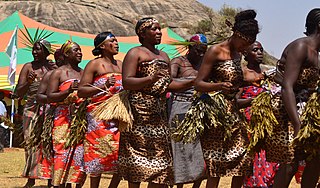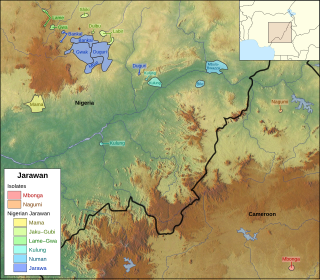Related Research Articles

The Chadic languages form a branch of the Afroasiatic language family. They are spoken in parts of the Sahel. They include 196 languages spoken across northern Nigeria, southern Niger, southern Chad, and northern Cameroon. By far the most widely spoken Chadic language is Hausa, a lingua franca of much of inland Eastern West Africa, particularly Niger and the northern half of Nigeria. Hausa, along with Mafa and Karai Karai, are the only three Chadic languages with more than 1 million speakers.

There are over 520 native languages spoken in Nigeria. The official language is English, which was the language of Colonial Nigeria. The English-based creole Nigerian Pidgin – first used by the British and African slavers to facilitate the Atlantic slave trade in the late 17th century – is the most common lingua franca, spoken by over 60 million people.

The West Chadic languages of the Afro-Asiatic family are spoken principally in Niger and Nigeria. They include Hausa, the most populous Chadic language and a major language of West Africa.
Guruntum is a Chadic language spoken in Bauchi and Alkaleri LGAs, Bauchi State, Nigeria. In 1993 it was spoken by about 15,000 people.
Chakato is a West Chadic language spoken in Plateau State, Nigeria. It was identified by Roger Blench in 2016. It is spoken by about 500 people in one village, Dokan Tofa, which is located on the Jos-Shendam road in Plateau State. Blench (2017) suggests that Chakato may be related to spurious records of the Jorto language. Chakato speakers claim that their language is closely related to Goemai.
Tal is an Afro-Asiatic language spoken in Plateau State, Nigeria. Tal is spoken in a cluster of 53 villages located east of the Panyam-Shendam road. There are 6 dialects of Tal, namely Bongmuut, Buzuk, Nbaal, Muɗak, Muɗong, and Takong.

The Angas, Angas–Sura, or Central West Chadic languages are a branch of West Chadic languages spoken in Plateau State, north-central Nigeria.
Warji (Warjawa) or Sirzakwai is an Afro-Asiatic language spoken in Bauchi State, Nigeria. Speakers are shifting to Hausa.

The North Bauchi languages are a branch of West Chadic languages that are spoken in Bauchi State, northern Nigeria.

Karai-karai is a language spoken in West Africa, most prominently North eastern Nigeria. The number of speakers of Karai-karai is estimated between 1,500,000 to 1,800,000 million, primarily spoken by the ethnic Karai-Karai people. It is an Afro-Asiatic language spoken principally in Nigeria with communities in Bauchi State, Yobe State, Gombe State and other parts of Nigeria. Many Karai-karai words share a common origin with the Northwest Semitic languages of Hebrew and Arabic. The Karai-karai language is most closely related to the Ngamo and Bole languages which are both considered derivatives of the Karai-karai language.

The South Bauchi languages are a branch of West Chadic languages that are spoken in Bauchi State and Plateau State, Nigeria.
Mantsi is an endangered Afro-Asiatic language spoken in Mangas town in Bauchi State, Nigeria. Blench (2020) reports that it is also called Mantsi. According to Blench, the structure of Mantsi differs significantly from the other South Bauchi languages.

Ron is an Afro-Asiatic language cluster spoken in Plateau State, Nigeria. Dialects include Bokkos, Daffo-Mbar-Butura, Monguna/Manguna (Shagau),. Blench (2006) considers these to be separate languages.
Daza or Dazawa is listed by Blench (2006) as a Chadic language within the Bole group, spoken in a few villages of Darazo LGA, Bauchi State, Nigeria. It was confirmed to exist in 2021. The language is nearly extinct with only elderly speakers speaking the language. Native speakers have shifted to Hausa.
The five Tarokoid languages are a branch of the Plateau family spoken in central Nigeria, just north of the middle reaches of the Benue River. Tarok itself has 300,000 speakers, with Pe and Sur about 5,000 each. Yangkam is severely endangered, being spoken by around fifty elderly men.
Zeem, or Chaari, is an endangered Chadic dialect cluster of Nigeria, whose speakers are shifting to Hausa. Dyarim is closely related.

Jarawan is a group of languages spoken mostly in Bauchi State, Nigeria, with some also scattered in Plateau State, Taraba State, and Adamawa State in the same country. Two related languages formerly spoken in Cameroon are now extinct but are believed to have belonged to the group. This connection between Nigerian and Cameroonian Jarawan is attributed to Thomas (1925). Whether Jarawan languages are best classified alongside other Bantu languages or among non-Bantu Bantoid languages is a matter of ongoing debate. A number of descriptions and classifications in the early 20th century suggest that they may be historically related to Bantu languages but not necessarily Bantu themselves. Other perspectives based on lexicostatistic modeling and other phylogenetic techniques for language comparison argue instead that Jarawan languages are properly classified alongside Zone A Bantu languages (A31-A40-A60). For classifications based on these more recent studies, see for example Blench (2006), Piron (1997), and Grollemund (2012).
Polci is an Afro-Asiatic language of Bauchi State, Nigeria. It is part of the Barawa cluster, which is in turn part of the West Chadic language family.
Geji (Gezawa) is a minor Chadic dialect cluster of Bauchi State, Nigeria. The three varieties are Buu, Gyaazi and Mәgang. The latter two are quite similar or alike.
Tala is a language from the West Chadian branch of the Chadic language family. The language is spoken in the central regions of Nigeria, and had approximately 1000 native speakers in 1993. The language is unwritten.
References
- ↑ Ju at Ethnologue (25th ed., 2022)

- ↑ Blench, Robert (2006). "The Afro-Asiatic Languages. Classification and Reference List" (PDF). Roger Blench Website. Publications. pp. 4–6. Archived from the original (PDF) on 2013-10-07.Retrieved2016-11-30.
- ↑ Blench, Robert (2012). "An Atlas of Nigerian Languages" (PDF). Roger Blench (3rd ed.). Archived from the original (PDF) on 2013-04-20.Retrieved2016-11-30.
- ↑ Blench, Roger (2021-01-01). "West Chadic classification 2021". Academia.
- 1 2 Lewis, M. Paul; Simons, Gary F.; Fennig, Charles D., eds. (2016). "Nigeria, Map 3". Ethnologue: Languages of the World (19th Edition). SIL International. Archived from the original on 2016-11-30.Retrieved2016-11-30.
- ↑ Blench, Robert (2012). "An Atlas of Nigerian Languages" (PDF). Roger Blench (3rd ed.). p. 45. Archived from the original (PDF) on 2013-04-20.Retrieved2016-11-30.